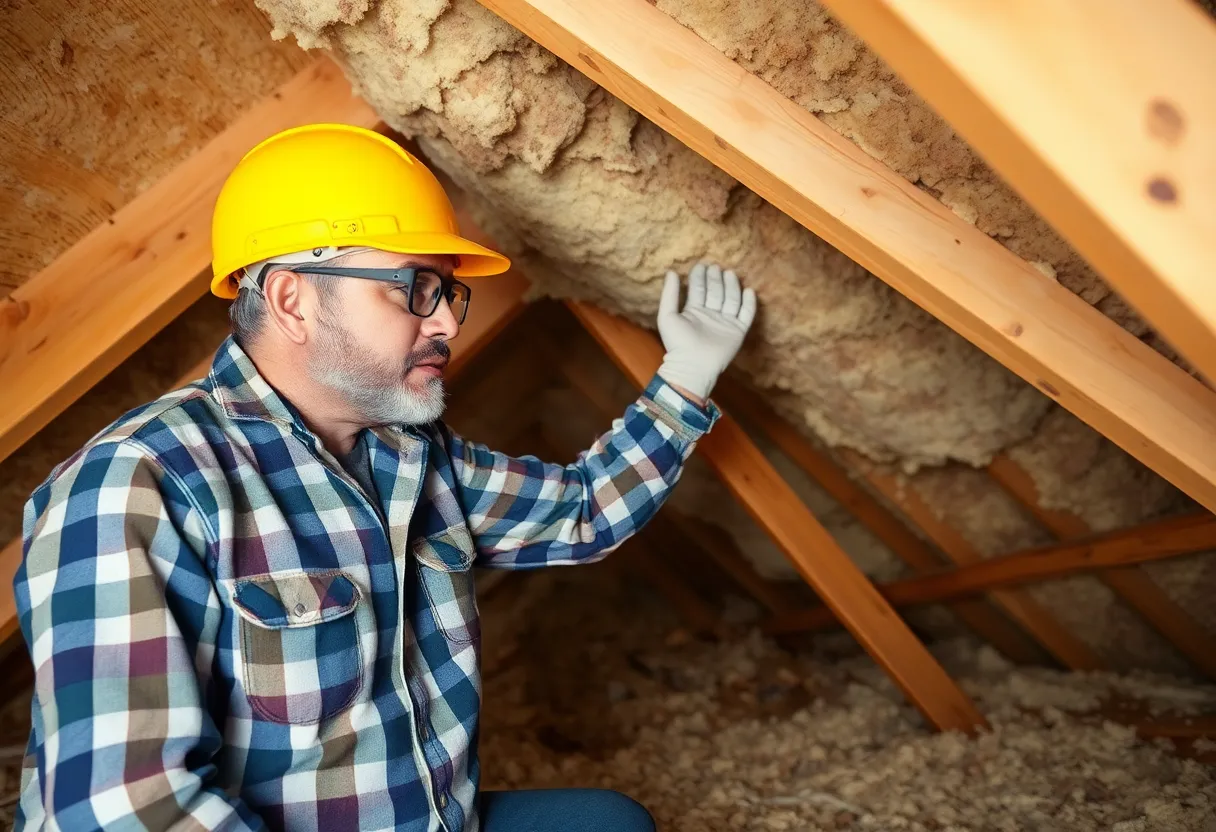News Summary
The risks of asbestos exposure in Illinois are highlighted by Michael Flores’ ordeal with a contractor’s negligence during a hazardous materials cleanup.
Concerns Surrounding Asbestos Removal and Regulations in Illinois
In a shocking revelation from Ottawa, Illinois, the risk of asbestos exposure has come to the forefront, highlighting significant loopholes in state regulations surrounding asbestos removal in residential properties. Michael Flores, who purchased a century-old house intending to turn it into a vacation rental near the scenic Starved Rock State Park, found himself embroiled in a nightmarish cleanup operation after discovering hazardous materials lurking in the attic.
Faulty Assurances and Expensive Cleanups
The house contained vermiculite insulation—a material notorious for containing asbestos fibers. With a staggering investment of nearly $20,000 paid to Clean Air Asbestos and Mold Control LLC for removal services, Flores expected a thorough and safe abatement process. However, what he discovered post-removal was alarming: piles of vermiculite were still present in the attic, rendering the space dangerous. Videos captured by Flores showed visible asbestos-containing material after Clean Air asserted their work was complete.
Fueled by concerns and doubts regarding the safety and thoroughness of the cleanup, Flores sought a second opinion from another contractor, who confirmed that remaining asbestos posed significant health hazards. To remedy the situation, Flores incurred additional costs of $8,000 for proper removal of the lingering asbestos, raising serious questions about the integrity of his initial contractor.
Disturbing Practices and Regulatory Inaction
The plot thickened when security footage revealed Clean Air workers operating without proper protective gear, raising red flags about their commitment to safety protocols. A response from Wm. W. Meyer & Sons Inc. only deepened the crisis; it indicated that the vacuum used by Clean Air was inadequate for asbestos removal. Despite these alarming findings, the Illinois Department of Public Health (IDPH) concluded that they had limited authority to act, as state regulations only mandate licensing for asbestos-related work in commercial buildings, leaving single-family homes completely unregulated.
This regulatory gap has allowed Clean Air Asbestos and Mold Control to remain listed as an approved contractor by the IDPH, void of any penalties or accountability. Astonishingly, nine states—including Illinois—maintain less stringent regulations that sidestep essential safety measures for private residences. Critics, including experts from Drexel University, argue that these loopholes pose dire health risks, as even a brief exposure to asbestos can lead to devastating conditions like mesothelioma cancer.
Litigation and Public Health Risks
In light of these alarming circumstances, legal actions have begun, with Flores now suing Clean Air for perceived negligence and wrongdoing. Interestingly, tensions escalated when Clean Air’s attorney sent Flores a cease-and-desist letter amid investigations into their practices. The saga extends beyond Flores, with another lawsuit targeting Kroger and SSI Services LLC for mishandling asbestos during renovations at a Taylorville store. Claims allege unsafe conditions, notably broken floor tiles and asbestos clinging from the ceiling.
The Broader Impact of Asbestos in Illinois
Illinois is significantly affected by asbestos exposure, ranking seventh in the nation for deaths linked to this hazardous material, with an estimated 600 lives lost annually. This alarming trend is compounded by the state’s vibrant industrial activity, which increases the exposure risk for countless workers. Furthermore, veterans from military facilities in Illinois have reported asbestos exposure, exacerbating health risks associated with prolonged contact.
The Illinois EPA is tasked with monitoring asbestos regulations, yet the growing number of complaints and health concerns calls for urgent reform in state policies. Residents must navigate a complex legal landscape when it comes to filing claims related to asbestos exposure, since proof of significant exposure is necessary, and claims come with time constraints.
As the saga of Michael Flores illustrates, the fight against the hazards of asbestos is far from over. Consumers must remain vigilant to protect their health and property, as the risk of exposure persists, particularly in states like Illinois where regulations remain alarmingly lenient. With evolving legal battles and public awareness, only time will tell if substantial reforms will take root within the high-stakes world of asbestos management.
Deeper Dive: News & Info About This Topic
HERE Resources
Asbestos Legal Battles: From Clarence Borel to Current Cases
Groundbreaking Study Reveals Genetic Insights into Malignant Pleural Mesothelioma
The Ongoing Threat of Legacy Asbestos: A Public Health Crisis
Health Under Siege: The Asbestos Crisis and Public Health Setbacks
Trump Administration Takes Steps to Reconsider Asbestos Ban
EPA Reconsiders 2024 Ban on Chrysotile Asbestos
Barretts Minerals: Bankruptcy Judge Questions Asbestos Levels in Talc from Montana
Philadelphia School District Faces Charges Over Asbestos Violations
Government’s Sharp Turn on Asbestos Ban Sparks Outrage
The School District of Philadelphia Faces Unprecedented Criminal Charges for Asbestos Violations
Additional Resources
- CBS News: Allegations of Improper Asbestos Removal in Illinois
- Wikipedia: Asbestos
- State Journal-Register: Illinois Sues Kroger for Asbestos Handling
- Google Search: Asbestos Removal Illinois
- Lake McHenry Scanner: Waukegan Hospital Sued for Asbestos Handling
- Encyclopedia Britannica: Asbestos
- Mesothelioma Hub: Illinois and Asbestos
- Google News: Illinois Asbestos News



















